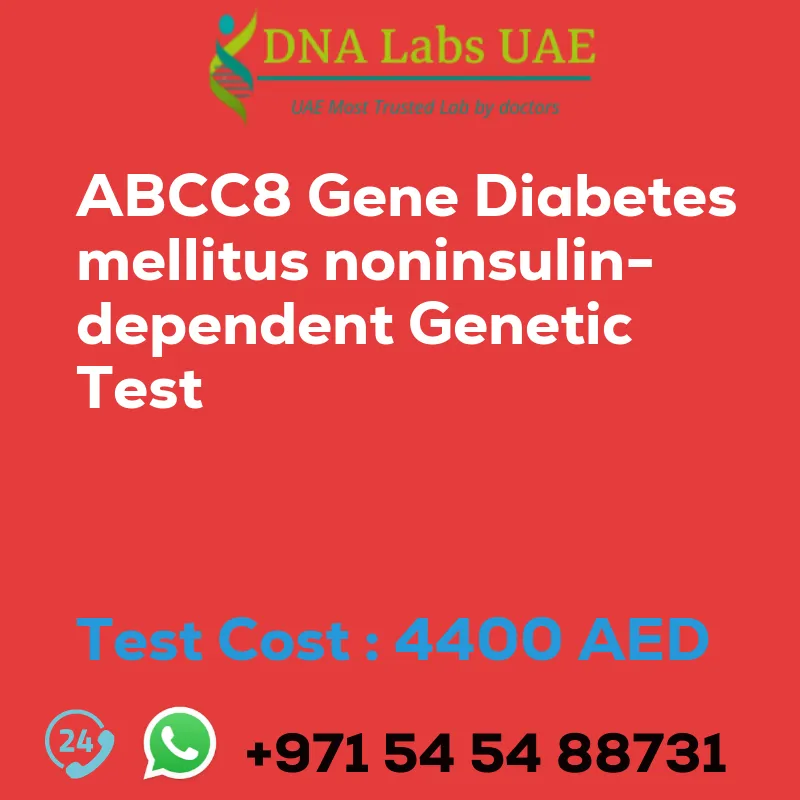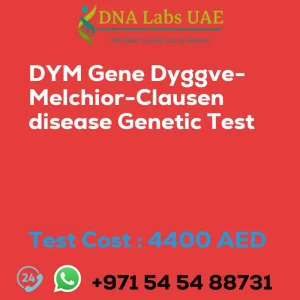ABCC8 Gene Diabetes mellitus noninsulin-dependent Genetic Test
Components:
- Test Name: ABCC8 Gene Diabetes mellitus noninsulin-dependent Genetic Test
- Price: 4400.0 AED
- Sample Condition: Blood
- Report Delivery: 3 to 4 Weeks
- Method: NGS Technology
- Test type: Metabolic Disorders
- Doctor: General Physician
- Test Department: Genetics
Pre Test Information:
Clinical History of Patient who is going for ABCC8 Gene Diabetes mellitus, noninsulin-dependent NGS Genetic DNA Test
A Genetic Counselling session to draw a pedigree chart of family members affected with Diabetes mellitus, noninsulin-dependent
Test Details:
The ABCC8 gene is associated with a form of diabetes called diabetes mellitus, noninsulin-dependent (NIDDM), also known as type 2 diabetes. NGS (Next-Generation Sequencing) genetic testing is a method used to analyze the DNA sequence of the ABCC8 gene to detect any variations or mutations that may be present. Type 2 diabetes is a chronic condition characterized by high blood sugar levels due to the body’s inability to properly use insulin or produce enough of it. The ABCC8 gene provides instructions for making a protein called sulfonylurea receptor 1 (SUR1), which is involved in the regulation of insulin secretion. NGS genetic testing of the ABCC8 gene can identify specific variations or mutations that may affect the function of the SUR1 protein. These variations can disrupt the normal insulin secretion process, leading to impaired glucose regulation and the development of type 2 diabetes.
Genetic testing for ABCC8 gene mutations can be useful in several ways. It can help diagnose individuals with a genetic predisposition to type 2 diabetes, especially in cases where the cause of the disease is unclear. It can also provide information about the risk of developing diabetes in family members of affected individuals. Additionally, NGS genetic testing can be used to guide treatment decisions. Some ABCC8 gene mutations may respond differently to certain medications used to manage type 2 diabetes, such as sulfonylureas. Knowing the specific genetic profile of an individual can help tailor their treatment plan to optimize their response to medication.
It’s important to note that genetic testing for diabetes is not typically used as a standalone diagnostic tool. It is usually performed in combination with other clinical and laboratory assessments to provide a comprehensive understanding of an individual’s risk and management options for type 2 diabetes.
| Test Name | ABCC8 Gene Diabetes mellitus noninsulin-dependent Genetic Test |
|---|---|
| Components | |
| Price | 4400.0 AED |
| Sample Condition | Blood |
| Report Delivery | 3 to 4 Weeks |
| Method | NGS Technology |
| Test type | Metabolic Disorders |
| Doctor | General Physician |
| Test Department: | Genetics |
| Pre Test Information | Clinical History of Patient who is going for ABCC8 Gene Diabetes mellitus, noninsulin-dependent NGS Genetic DNA Test A Genetic Counselling session to draw a pedigree chart of family members affected with Diabetes mellitus, noninsulin-dependent |
| Test Details |
The ABCC8 gene is associated with a form of diabetes called diabetes mellitus, noninsulin-dependent (NIDDM), also known as type 2 diabetes. NGS (Next-Generation Sequencing) genetic testing is a method used to analyze the DNA sequence of the ABCC8 gene to detect any variations or mutations that may be present. Type 2 diabetes is a chronic condition characterized by high blood sugar levels due to the body’s inability to properly use insulin or produce enough of it. The ABCC8 gene provides instructions for making a protein called sulfonylurea receptor 1 (SUR1), which is involved in the regulation of insulin secretion. NGS genetic testing of the ABCC8 gene can identify specific variations or mutations that may affect the function of the SUR1 protein. These variations can disrupt the normal insulin secretion process, leading to impaired glucose regulation and the development of type 2 diabetes. Genetic testing for ABCC8 gene mutations can be useful in several ways. It can help diagnose individuals with a genetic predisposition to type 2 diabetes, especially in cases where the cause of the disease is unclear. It can also provide information about the risk of developing diabetes in family members of affected individuals. Additionally, NGS genetic testing can be used to guide treatment decisions. Some ABCC8 gene mutations may respond differently to certain medications used to manage type 2 diabetes, such as sulfonylureas. Knowing the specific genetic profile of an individual can help tailor their treatment plan to optimize their response to medication. It’s important to note that genetic testing for diabetes is not typically used as a standalone diagnostic tool. It is usually performed in combination with other clinical and laboratory assessments to provide a comprehensive understanding of an individual’s risk and management options for type 2 diabetes. |








